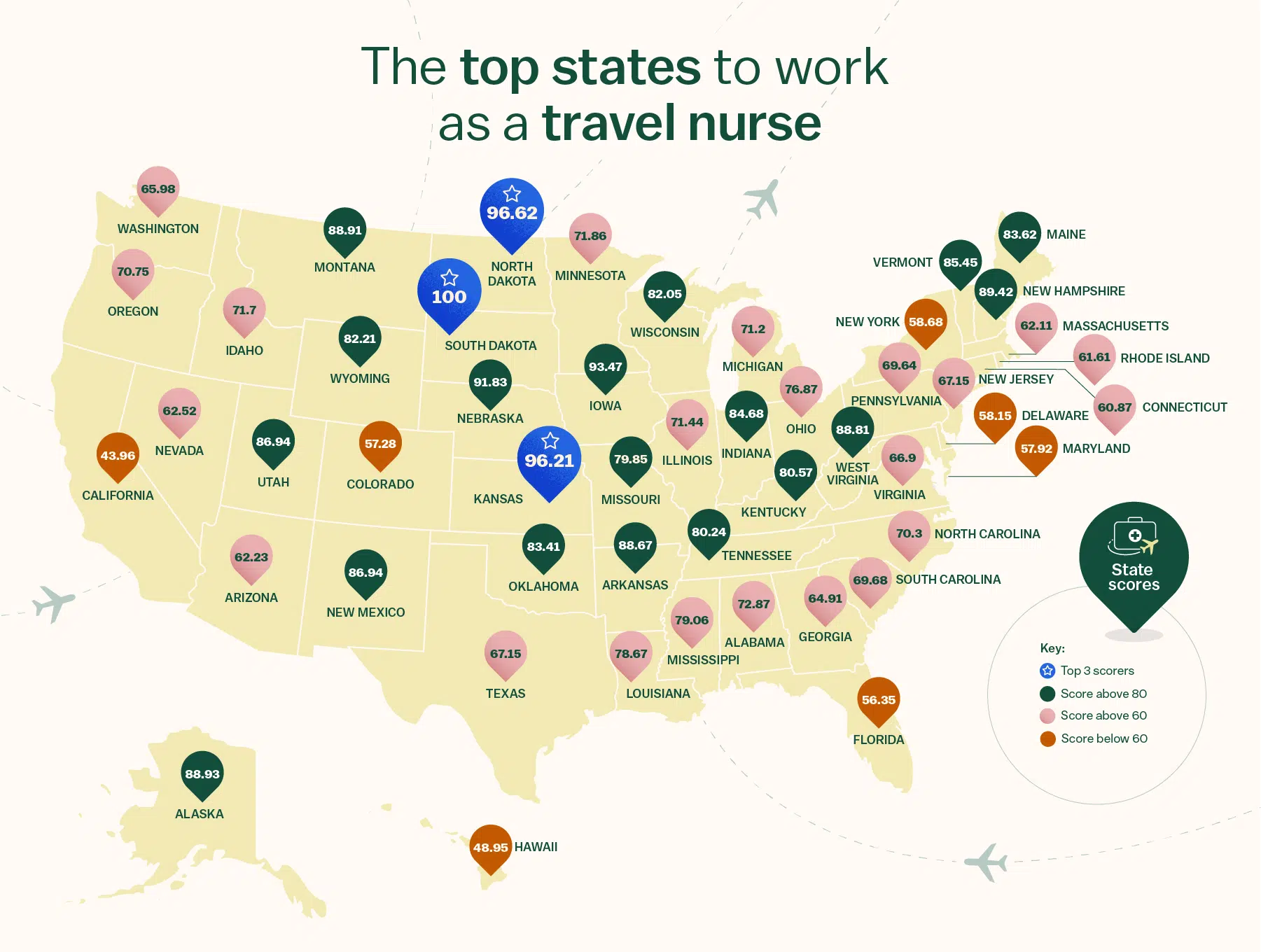Whether you’re new to nursing or you’ve been a staff nurse for years, travel nursing jobs may be something you’ve heard about in passing but never seriously considered. Maybe you’re not 100% sure what a travel nurse is, what they do or why you’d want to try travel work. This guide has those answers and more.
What Is a Travel Nurse?
Travel nurses are like staff nurses, except they take temporary assignments to help fill staffing shortages at various healthcare facilities around the country. Nurse staffing agencies contract with nursing professionals with clinical experience to take on non-permanent roles with hospitals, clinics, long-term care facilities and other medical establishments. Travel nurses usually work for these agencies, not the individual facilities where they actually perform their jobs. Agencies place travel nurses in temporary jobs with healthcare systems they partner with to provide supplemental staffing. Assignments typically last 13 weeks but can be shorter or longer, depending on the situation.
Who Can Be a Travel Nurse?
Registered nurses (RNs), licensed practical/vocational nurses (LPN/LVNs) and advanced practice RNs such as nurse practitioners, clinical nurse specialists, certified nurse midwives and certified RN anesthetists can all work as travel nurses if they have the requisite clinical experience and have or can obtain the necessary licensure. Travel nurses usually need at least one year of acute care experience in their specialty, but some high-acuity roles may require two years. Even certified nursing assistants can take on travel roles if they qualify.
What Do Travel Nurses Do?

Most travel nurses work full-time, performing the same job duties as staff nurses in the same roles. Travel nurses may be needed in any specialty. However, based on job openings on Vivian Health, some common specialties with regular openings for travel nurses include:
- Med Surg
- Telemetry
- Intermediate Care
- Progressive Care
- Stepdown
- Intensive Care
- Emergency Department
- Operating Room
No matter the specialty, facilities expect travel nurses to perform all the duties of staff nurses with little orientation and no training. You must be comfortable hitting the ground running while working in fast-paced, unfamiliar environments.
Why Are Travel Nurses Needed?
All nurses can relate to the short-staffing issues plaguing the healthcare industry. Nursing shortages can occur in any state, specialty and type of healthcare facility. And it’s not just nursing shortages. You’ll also find numerous travel allied health jobs in various sectors due to staffing shortages.
Travel nurses help fill staffing holes while managers recruit and train permanent staff. They may help cover unexpected leaves of absence or planned absences, such as maternity or paternity leaves. Travelers might assist during strikes, round out staff during seasonal population fluctuations or unanticipated increased patient census or provide an extra set of hands during an electronic health record conversion.
Where Are Travel Nurses Needed the Most?
Travel nurses are needed everywhere there’s a nursing shortage, which can literally be anywhere. However, some areas may have higher needs than others. Cities and states with higher needs and less popular rural areas typically pay a bit more than travel nursing jobs in easy-to-fill areas. However, popular areas like California often still pay more due to a higher cost of living.
According to Vivian’s 2023 Travel Nurse Location Index, the following represents the top 10 best states for travel nurses to work based on salary, number of jobs available, number of hospitals per capita and cost of living:
- South Dakota
- North Dakota
- Kansas
- Iowa
- Nebraska
- New Hampshire
- Alaska
- Montana
- West Virginia
- Arkansas
Besides these crucial factors, you may choose a location because it’s somewhere you’ve always wanted to visit but never had the time or money. The odds are good that no matter how or where you choose to travel nurse, there’s going to be a need for your skills. Choose your top five locations, determine how much money you need to make and check out the jobs waiting for you to apply.
Where Are Popular Travel Nursing Locations?
There isn’t one set place that’s most popular among travel nurses because everyone has different notions of their ideal environment. However, California has historically made many travel nurses’ must-go lists.
Living in the Golden State, even temporarily, appeals to many people for its wonderful year-round weather in most parts of the state and the amazing number of things to do and see statewide. Working in California is also appealing due to the state’s excellent patient ratio laws and decent pay scale, which is unfortunately tempered by the high cost of living.
Many nurses seek the highest-paying travel nursing jobs, so popular locations can vary greatly. A smart travel nurse compares the compensation to the cost of living to make the most fiscally responsible decision. But you can literally travel anywhere with a travel job posted as long as you are licensed in that state.
What States Can You Travel To?

© Vivian Health 2023
You can travel to any state in which you’re licensed. Once licensed in one state, you can apply for an RN license by endorsement in other states and hold individual licenses in as many states as you want after passing each state’s prerequisites. You may also qualify for a temporary license in many states if you’re in a hurry because you can’t sign a travel nursing contract if you don’t hold a license in the state of practice.
Even better, if your home state is part of the Enhanced Nurse Licensure Compact (eNLC) and you qualify for a multistate license, you can travel to and work in other Compact member states under your Compact license. RNs and LPNs/LVNs with a multistate license may practice in person or via telehealth in any state that’s part of the Compact. As of March 2023, 39 U.S. states or territories have enacted legislation to join the eNLC.
Can Travel Nurses Work Close to Home?
Travel nurses can work close to home through local contracts. Many hospitals and healthcare systems rely on local agency staff to help complete their schedules. When taking a local travel nurse contract, you won’t qualify for tax-free stipends because you work at or near your permanent tax home and don’t require separate overnight housing. Although wages on local contracts are fully taxed, you can still earn more than in staff positions with the bonus of working in various settings.
Travel nurses may also be able to work close to home through regular healthcare travel contracts depending on the mileage radius required by the facility. Most healthcare facilities require travelers to work at least 50 miles from their permanent tax home to be eligible for tax-free stipends. Otherwise, they’re considered local travelers. Some facilities require a greater distance, so confirm the minimum radius required with your recruiter.
Working 50 miles from your home could net you tax-free wages, which helps you keep more of your paycheck. To qualify, you must have overnight lodging near your workplace and still maintain your permanent residence, thus duplicating your housing expenses. Best of all, you could visit home on your days off if you’re only 50 miles away.
However, travel nurse tax laws are complicated, and the Internal Revenue Service (IRS) doesn’t set a minimum distance, which muddies the situation. Check with a tax professional experienced with the unique rules of travel healthcare workers to ensure you’re following current IRS regulations and avoid a surprise tax bill.
Do Travel Nurses Make More Money?
Most travel nurses make more money than they would as staff nurses, whether they qualify for tax-free stipends or receive fully taxed wages. While how much more depends on your total pay package and the cost of benefits, travel wages are typically significantly higher.
During the week ending March 24, 2023, Vivian Health’s salary data listed the nationwide average wage for staff RNs at $37.24 per hour, with the highest-paying positions at $79. Comparatively, travel nurse pay averaged $2,370 per week during this period. This weekly rate works out to $59.25 per hour in a 40-hour workweek. However, the highest-paying travel job paid $5,940 or $148.50 per hour for an RN First Assist position in Boston, Massachusetts.
Because travel nurses can travel to where the demand is highest at that particular time, they tend to receive substantially higher pay. But they also have larger expenses since short-term housing and extended-stay hotels typically cost more than long-term leases. In the end, travel nurses still make more money.
How Are Travel Nurses Paid?
Travel nurses are paid through the agency they contracted with, usually every week or every other week. The agency sets the travel nurses’ pay rate, a percentage of the total bill rate the healthcare facility pays the travel nursing agency to supply a nurse to fill a specific role.
Travel nurse salaries work in one of two ways. Nurses with a permanent tax home who qualify for tax-free stipends receive a blended rate of taxed wages and untaxed stipends to arrive at a total hourly rate. Conversely, travelers who don’t qualify receive fully taxed wages.
RELATED: Everything Travel Nurses Want to Know About Bill Rates
Is Travel Nursing a Career?
Travel nursing is a definite career path option. Many travel nurses travel for years before returning to a permanent staff position, and some just keep traveling and never go back to staff nursing. Whether you spend the bulk of your nursing career traveling or just a portion, it’s a legitimate career choice and a great way to see the country.
Why Would You Want to Be a Travel Nurse?
Just like staff nursing, travel nursing has its fair share of advantages and disadvantages. Weighing the pros and cons helps you determine whether travel nursing is right for you.
RELATED: Travel Nurse Careers: Is Travel Nursing Right for You?
Cons of Travel Nursing
- Multiple license requirements. If you don’t live in an eNLC state or don’t qualify for a multistate license, you need a license by endorsement or individual state licenses in every state you take a travel contract. Depending on the number of states you want to work in, it could be a lot to keep up with.
- You don’t build seniority. You’re literally the “new” nurse on the block every few weeks or months. About the time you’ve learned all the policies and procedures of one facility, you’re off to the next one. Constantly moving locations makes building seniority at an individual facility difficult, but you could build respect as a quality travel nurse.
- Schedules might not be ideal: Typically, facilities hire travel nurses to fill specific needs. These needs may include working less desirable night and weekend shifts. Be prepared to work the days and shifts staff nurses don’t want.
- Varied pay impacts your budget. Each travel contract has unique pay packages, causing your weekly income to fluctuate each time a contract ends. Constantly shifting wages makes creating and sticking to a budget or paying back large nursing student loans challenging.
RELATED: Healthcare Education Loan Forgiveness: A State-by-State Guide
Pros of Travel Nursing

- Salaries are phenomenal. Despite pay rates dropping from pandemic highs, travel nurse wages are still substantially higher than staff salaries. Additionally, if you qualify for tax-free stipends, you earn more while paying less in taxes. Agencies often cover the cost of RN licensure and professional certifications, providing another monetary perk. One more pro regarding pay, you don’t have to wait for an annual raise; just look for higher-paying contracts to earn a “raise” whenever you want.
- Opportunities for career building. The experience you gain as a travel nurse allows you to learn new hard and soft skills that help you enhance your nursing career. Traveling also gives you the opportunity to meet new healthcare colleagues and expand your professional network across the nation. Forging an extensive network is a fantastic career builder.
- Supreme flexibility. Travel nursing offers lots of flexibility when it comes to your time off. You can request time off to be written into your contract if you want specific days off during an engagement. You can also take time off between contracts. Because you’re earning more than you would on staff, you could afford to take extended vacations when you want to take them instead of when you’re approved for time off. You could also work most of the year and take a month or two off during the holidays, although lucrative contracts often pop up during holidays when many staff nurses also want time off.
- Have adventures and a paycheck. The foundation of travel nursing is traveling to new locations regularly, and you get to decide where you want to go next. Explore new areas of the country with each new contract to plan adventures around the nation while getting paid. Traveling for a living makes it easier to plan vacations in spots you’d never thought you’d have the time or money to visit.
There are so many perks to travel nursing. The money, the freedom to choose when you work and when you take a break, exploring cool new locations, the added professional experiences and many more reasons all point to why you should become a travel nurse. Plus, you’ll meet some amazing nurses and learn a lot about yourself along the way.









